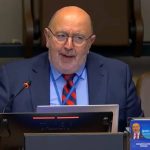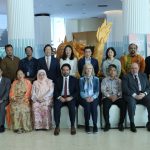Oral Statement by Alex Vazquez, as representative of IFFD, at the Commission for Social Development 2024, 12th February, on the Civil Society Declaration for the 30th Anniversary of the International Year of the Family.
Since the World Summit for Social Development in Copenhagen in 1995, the Commission for Social Development (CSocD) has been the key United Nations body in charge of the follow-up and implementation of the Copenhagen Declaration and Programme of Action.
Madame Chair,
My name is Alex Vazquez from the International Federation for Family Development.
Since 2018, a group of transnational and regional organizations has been fully involved with the Preparations of the 30th Anniversary of the International Year of the Family. In order to make every effort count, we have been working on a Civil Society Declaration. The Declaration tries to integrate family needs into the various Megatrends proposed by the Secretary General, be an effective instrument to foster partnerships and share substantial contributions from experts on family policies.
The Civil Society Organizations that have signed the Declaration so far, declare their resolution to contribute and work together with the UN-System, Member States, other stakeholders and recommend:
(On) New Technologies
Address the intergenerational digital gap among all family members in order to design and implement policies and programs to strengthen solidarity, recognize interdependence, ensure equal educational access, build mentorship schemes among generations and promote positive interactions and intra-family relations.
Promote the use of new technologies in flexible work arrangements such as teleworking, through the provision of public and private services, infrastructure and social protection policies to enable families to fulfill their care responsibilities.
Ensure accessible technology to all family members, considering it as an investment to develop educational programmes, new services, jobs and forms of cooperation. In an effort to achieve equity and reduce the digital divide, work towards a universal access to proper underlying infrastructure, devices, skills and protection from abuse and harmful practices.
Encourage and assist open communication between parents and children, fostering resilience and good use of technology, including awareness about online risks.
(On) Climate Change
Develop strategies to face the impact of climate change on families by assessing challenges regarding food security, housing, energy and health through family strengthening, family networks and parenting programs.
Support a better understanding of the active role of families regarding circular economy and promote adequate legislation and education for it.
Emphasize the role of the younger generation addressing causes and consequences of climate change.
Involve the private sector through their efforts in environmental, social and governance strategies.
Thank you Madame chair.






